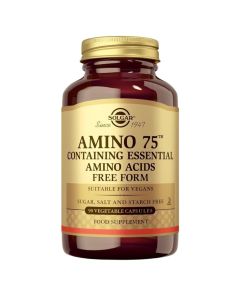
Amino Acids: Functions, Uses & Benefits
By: Girish Desai Pharmacist (GPhC ), Nutritionist and Homeopath
Do you know what amino acids are or what they are for? If you don't then you aren't alone. While we talk a lot about the vitamins and minerals we need to support a healthy life and a strong body, we can sometimes forget to talk about the other important nutrients required to live long, happy lives.
Here, we look at what amino acids are, break down the different types, look at how they are used in the body and therefore what the benefits of amino acids in your diet are.
What Are Amino Acids?
‘Amino acids’ is the name for a group of organic compounds that are key to your body growing and functioning properly. They form one of the fundamental building blocks of proteins. They are primarily composed of nitrogen, carbon, hydrogen and oxygen, plus variant additional elements within each type of amino acid.
Types Of Amino Acid
There are 22 identified amino acids, though only 20 are commonly considered when it comes to our health. The 21st, Selenocysteine, is a special case and an outlier in how it operates, and the 22nd, Pyrrolysine, is not used in humans. Here, we'll be focusing on the core 20.
There are three sets that the types of amino acids fall into based on whether we are able to create them in our bodies or not. They are:
- Non essential amino acids – So called because we are able to synthesise (create) them in our bodies, so we don't need to get them from an external source.
- Conditional amino acids – These can be created in the body, however, production can be impeded if you are stressed, sick or not consuming enough protein and carbohydrates to support production.
- Essential amino acids – The most important ones for those thinking about their health. We can't synthesise these amino acids and need to get them from food.
Amino Acids Functions

Each amino acid has a function in the body, working with other nutrients and compounds to ensure your body works, grows, heals and does everything you need it to. They are building blocks for proteins but also assist in the synthesis of hormones, chemical messengers for bodily functions and organs, and neurotransmitters, the nerve cell messengers which talk to muscles, glands and nerves.
Essential Amino Acids
Our understanding of amino acids is still in development. Having identified the essential amino acids, we have been able to learn how each of them functions in the body, proving their value. There is plenty of overlap in their roles, as well as in their functions reliance on other nutrients.
The roles of the essential amino acids can be summarised, briefly, as such:
- Histidine – This amino acid helps with the production of histamine, a neurotransmitter that plays a key role in digestion, sexual function, immune response and sleep-wake cycles.
- Isoleucine – Muscle metabolism and muscle tissue are two of the specialities of this amino acid, alongside playing a part in energy regulation, immune function and hemoglobin (the protein in red blood cells) production.
- Leucine – This amino acid deals with the regulation of blood sugar levels, wound healing, muscle repair and the production of growth hormones.
- Lysine – Absorption of calcium, hormone and enzyme production and protein synthesis are all the purview of lysine, with a supporting role in collagen, elastin and energy production, and immune function.
- Methionine – With this amino acid, your metabolism and detoxification processes wouldn't happen, it is also needed for tissue growth and to facilitate the absorption of important minerals (zinc and selenium).
- Phenylalanine – Integral to the functioning of proteins and enzymes in the body, it also enables the production of other amino acids.
- Threonine – Working to support connective tissue and the skin, it is part of the structure of collagen and elastin, and is part of how your body metabolises fat.
- Tryptophan – A precursor to serotonin, which regulates appetite, mood and sleep, it is also necessary for the maintenance of nitrogen balances in the body.
- Valine – This amino acid is part of energy production, muscle growth and regeneration.
Conditional Amino Acids
Unless you are unwell or otherwise out of balance nutritionally, you will be able to synthesise conditional amino acids. They perform functions including:
- Cell repair
- Collagen formation
- Insulin secretion
- Protein breakdown
- Protein regeneration
The conditional amino acids are:
- Arginine
- Cysteine
- Glutamine
- Glycine
- Proline
- Tyrosine
Non Essential Amino Acids
The non essential amino acids are:
- Alanine
- Aspartic acid
- Asparagine
- Glutamic acid
- Serine
- (Selenocysteine)
- (Pyrrolysine)
Non essential amino acids are created and used for various functions, including:
- Immune function
- Tissue growth
- Tissue Repair
- Red blood cell formation
Sources Of Amino Acids

Studies have found it difficult to ascertain how much of each essential amino acid is necessary for healthy living. Nevertheless, they need to form part of your diet and you can ensure that happens by understanding which foods are sources of amino acids and how to use supplements (if you aren't able to consume those foods).
Amino Acid Foods
Many foods are sources of amino acids, though not all sources contain all types of amino acids. Foods you think of as good sources of protein tend to be the ones that have amino acids, such as meat, fish and cheese, as well as nuts and lentils.
Here, we look specifically at each of the essential amino acids and list the foods that are a great source of them:
- Histidine – Fish, meat, nuts, poultry, seeds and whole grains.
- Isoleucine – Cheese, eggs, fish, lentils, meat, nuts, poultry and seeds.
- Leucine – Beans, legumes, soy and dairy products.
- Lysine – Black beans, eggs, meat, pumpkin seeds, quinoa and soy products.
- Methionine – Eggs, grains, nuts, seeds and tofu.
- Phenylalanine – Beans, dairy, fish, meat, nuts, poultry and soy.
- Threonine – Cottage cheese, liver, shellfish and wheat germ.
- Tryptophan – Chicken, cottage cheese, turkey and wheat germ.
- Valine – Broccoli, cheese, mushrooms, peanuts, whole grains.
Amino Acids Supplements
If you are following a vegan or vegetarian diet, or have allergies to soy, seeds or nuts, then you may find that getting enough, varied, amino acids is difficult. This is where amino acids supplements can be useful. Additionally, if you struggle to get enough of the right nutrients, for whatever reason, you may want to think about taking a supplement.
We recommend:
Health Benefits: Uses For Amino Acids
Amino acids are crucially important for a healthy functioning body, working in concert with vitamins and minerals to make every part of your body work. Apart from the day-to-day value of amino acids, there are a few specific ways in which being aware of your intake might be affecting your health – for better or worse.
Here, we look at what studies have uncovered in relation to amino acids and health. Not all these studies are conclusive as we are continuing to develop our understanding of all nutrients, but they are encouraging signs of how this specific group of compounds might better our health.
Improving Fitness
Amino acids certainly play a role in the development and maintenance of muscles in the body, though they don't do it alone. With a growing global interest in fitness techniques, and specifically pre and post workout nutrition, a 2017 study found that ingesting amino acids after a workout can help to aid recovery, reducing muscle soreness.
This is interesting enough, but it can be paired with a 2016 study which discovered that amino acid supplementation has also been found to help with muscle retention in active adults/athletes. For those who are undertaking serious fitness regimens, such as aspiring or professional athletes and trainers, this presents a potential avenue for maximising workouts.
Additionally, as amino acids are building blocks of muscle tissue, it makes them key to building muscles, which is the focus of extreme fitness scenarios like bodybuilding. Here, leucine, isoleucine and valine amino acid supplementation could prove valuable.
Reducing Hair Loss
Hair loss is one of the most enquired about topics related to hair health. Many solutions have been sought out, along with numerous studies into why it occurs. Sadly, there is no concrete evidence of a miracle solution. However, one study has found that amino acids, specifically l-lysine along with iron, contributed to a reduction in hair loss when used on those experiencing increasing loss.
Another study found that “Oral administration of L-cystine (70 mg) used in combination with retinol increases both hair density and anagen [growth] rate”. This offers some insight into how amino acids, along with other nutrients, might be used to slow or reverse hair loss in the future.
Improving Mental Health
Mental health is being taken more seriously than ever before, and is being seen as equally important to physical health – both of which can affect one another. Issues like stress, depression, anxiety and poor sleep are being tackled from all angles to find ways to improve them.
A 2019 study found that “four weeks L-theanine [amino acid] administration has positive effects on stress-related symptoms and cognitive function in a healthy population”. This study did note that it was not a conclusive finding though it was considered encouraging that, when compared to a placebo group, those taking the amino acid reported reductions in stress-related symptoms and improved cognitive function.
Shop Amino Acids
Disclaimer
The products offered are not intended to diagnose, treat, cure, or prevent any illness or disease, or to replace the advice of a medical professional. Results are not guaranteed and may vary from individual to individual.





